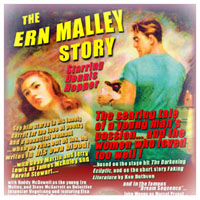Here’s the twentieth installment of LiteratEye, a series found only on The Art of the Prank Blog, by W.J. Elvin III, editor and publisher of FIONA: Mysteries & Curiosities of Literary Fraud & Folly and the LitFraud blog.
LiteratEye #20: Can a Spoof Morph Into the Real Deal?
By W.J. Elvin III
July 3, 2009
 The intemperate torch grazed
The intemperate torch grazed
With fire the umbel of the dark.
The pond-lilies could not stifle
The green descant of frogs.
Is it possible for a hoax, a masterpiece of ridicule, to morph into a respected example of exactly what it was meant to spoof? That’s a serious question regarding the lines quoted above, a snippet of work of the poor lost legendary poet, Ern Malley.
An obscure, young Australian insurance salesman and part-time watch repairman in the days prior to World War II, Malley never lived to see his work become world famous. Well, for that matter, he never lived at all.
As I was saying last week, Australia seems a hotbed of literary fakery. There are many reasons, to be sure, but one must be appreciation.
Ern Malley and his poems are something of a national Australian treasure, right up there with kangaroos and opals and The Jolly Swagman.
Malley finds a spot on just about anyone’s list of the top ten literary hoaxes of all time. And so, probably everything that can be said about the prank has been said a hundred times over in articles and books. Except for one thing. What’s yet to be done in any depth is a study of how the poems migrated from satire to serious fodder for anthologies and college courses.
In the event you’ve missed the finer points of the case, you might want to follow-up at the very thorough Jacket literary magazine site, or pick up a copy of the book everyone else quotes, The Ern Malley Affair by Michael Heyward. It was Heyward who told an interviewer: “I think Ern Malley is a comic masterpiece.”
In October 1943, Australian poets James McAuley and Harold Stewart concocted a group of poems out of bits and pieces from a bizarre mix of sources. A co-conspirator sent the collected work, titled “The Darkening Ecliptic,” off to Angry Penguins, a journal of modern poetry, claiming it was the work of her brother, Ern Malley, recently deceased.
The journal published the poems as some kind-a wonderful.
The hoaxers then claimed victory. And the story made big news in Great Britain and the United States, no small feat in the thick of raging war.
The situation took a weird turn. As a result of the publicity, authorities peeked into the issue of Angry Penguin, seized remaining copies and charged the editor with publishing indecencies.
At the conclusion of a bizarre trial, detailed in documents on the Jacket site, the editor was fined. The Ern Malley hoax was on its way to legendary status. And almost no one associated with it lived particularly happily, ever after.
I don’t know if the perpetrators said as much, but the Malley hoax surely has roots in the famous earlier Spectra hoax. In that case, a pair of poets published a book of nonsense poems that were hailed by a legion of critics and readers as marvelous stuff.
Poetry-based hoaxes have a rich history.
And there have been a number of similar spoofs since. Although I haven’t seen it stated as fact, it’s probable that the more recent Nat Tate spoof descended from Spectra and Malley. The Tate hoax was far more elaborate in terms of creation of an identity, though. We’ll take a look at that one shortly.
To the perplexity of some critics, the Angry Penguin crowd, despite a bit of ridicule, maintained that Malley was a work of genius. And, strange though it may seem, that opinion has gained ground.
“The myth is sometimes greater than its creator,” Angry Penguins editor Max Harris wrote.
Sure, the stuff would baffle an old-time balladeer, but an influential gaggle of critics, poets and professors can’t be wrong. Can they?
The poet and critic David Lehman, in an article found on the Jacket site, says the Malley poems achieve “an effect that other poets of the period strove for but few attained so unerringly “¦” The work is now anthologized (The Penguin Book of Modern Australian Poetry) and incorporated into college courses — as genuine, inspired poetry, despite full awareness of the authors’ intentions.
image: Jacket Magazine
(Copyright 2009 WJE, exclusive to The Art of the Prank, for reprint rights contact Literateye@gmail.com)
Check out previous LiteratEye episodes on The Art of the Prank.
